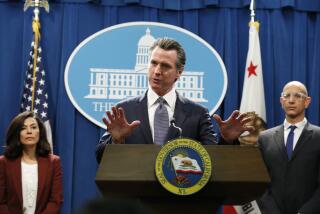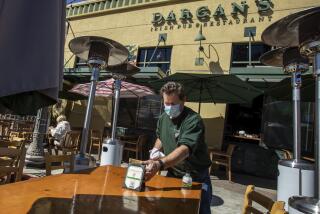California counties stuck in limbo as they wait for Newsom’s reopening rules
- Share via
Gov. Gavin Newsom said Monday more counties came off California’s COVID-19 watchlist over the weekend after posting declines in cases, transmission rates and hospitalizations for three consecutive days and that guidance was expected to be released this week.
- Share via
SACRAMENTO — Gov. Gavin Newsom appeared to deliver welcome news on Monday to counties that have slowed the spread of coronavirus and been removed from the state’s watchlist only to find themselves in limbo as they await his long-promised reopening rules.
The governor said counties must wait two weeks to reopen businesses after they come off the state’s list, a timeline that would allow Santa Cruz to open later this week and Placer and San Diego to follow the week after.
“There has to be a 14-day period between the application [and] implementation of not only schools but reopening any sector of the economy,” Newsom said Monday. “So, there’s no delay in that respect for these counties moving forward.”
But later an aide sought to recast Newsom’s comment and it became clear that he misspoke. The fumble only added to the confusion county officials across California are feeling about the directives — or lack thereof — coming from Sacramento since the pandemic began. While Newsom has preached the importance of local control, the state has taken the lead on California’s response and announced public health guidelines with little notice and less explanation for how counties should interpret the rules.
“I know these are unprecedented times,” said Placer County Supervisor Bonnie Gore. “I know they are busy, but we have residents who are very concerned and I don’t have answers. We don’t have the freedom to make our own decisions so we have to ask the state for direction. I want to be sympathetic to the state, but we have residents asking us and we feel like our hands are tied.”
Under a system developed by the state, counties are added to the monitoring list and must shutter additional businesses if they experience three days of elevated disease transmission, increased hospitalizations or limited hospital capacity. Counties drop off the list if those trends reverse and they meet the state standards for another three days.
Eight counties in California have been removed from the list and are waiting for state guidelines to instruct them on how and when they can begin reopening some of the businesses and sectors they had been forced to close, such as indoor church services, gyms and malls.
Though the governor said Monday that the process would begin two weeks after a county falls off the list, he meant that no counties had been off the list for more than two weeks, the length of time they must wait before opening schools, said Kate Folmar, a spokeswoman for California Health and Human Services.
“Our revised framework to be released later this week will give more clarity on how long of a pause is required between tightening and loosening restrictions on sectors,” Folmar said.
By most measures, California’s first reopening didn’t go as well as Newsom had hoped.
The state ultimately allowed counties to reopen before they met state thresholds for contact-tracing staff and daily targets for testing. Newsom also loosened rules that had barred counties with COVID-19 deaths in the previous two weeks from reopening, one of several changes he said in mid-May would have allowed 53 of 58 counties to begin that process.
The virus surged and by July, the state began implementing business restrictions again.
This time around, the governor has said the state will keep tighter controls on county reopenings. As the state develops a new process, the Newsom administration has also been grappling with record-setting wildfires, a historic heat wave, power outages and lightning strikes.
Santa Cruz became the first county removed from the watchlist following data issues that forced the state to freeze the list, much to the dismay of local officials. The county dropped off the list days before major wildfires ignited in the region.
“Unfortunately, us coming off the watchlist coincides with the fires,” Santa Cruz County Supervisor Ryan Coonerty said. “There hasn’t been a lot of time to work through the implications of coming off the watchlist. This crisis has surpassed our previous crisis. But as things stabilize, we will try to figure these things out going forward.”
Since Santa Cruz County was removed, Coonerty and fellow Santa Cruz County Supervisor Zach Friend said there has been no communication from the state about what that means.
“The county has not received a timeline or metrics, and neither has any other county I’ve talked to,” Friend said.
The lack of clarity from the governor’s office predates the most recent round of disasters.
Los Angeles County Supervisor Kathryn Barger said the governor’s announcements and orders have lacked detail and been difficult to implement. She also said that counties have not been given enough notice before the state announces major decisions.
Barger cited a recent example of contradictory messaging from the state public health department and the state Board of Barbering & Cosmetology over the ability of hair salons to operate outdoors. The board and the department disagreed about whether outdoor salon services were allowed and Newsom was forced to publicly clarify that they were allowed days after he shut down businesses.
“It causes confusion,” Barger said. “When you’ve got industries that are already frustrated, that becomes even more exacerbated.”
San Diego Mayor Kevin Faulconer and County Supervisor Greg Cox joined the chorus of county officials seeking more information earlier this month. In a letter to Newsom on Aug. 14, they requested “clear and consistent” reopening guidance for counties that are now in compliance with the state’s metrics.
“The lack of a consistent process for these businesses, with logical, data-driven triggers, exacerbates an increasingly difficult economic situation, and undermines the credibility of and compliance with the state’s public health order,” they wrote.
As county officials await more information, Gore said that every day the state does not release the rules is another day cash-strapped businesses are unable to plan for their future.
“Our businesses want to hear this now,” she said. “Businesses need time to adjust. They are just waiting.”
More to Read
Sign up for Essential California
The most important California stories and recommendations in your inbox every morning.
You may occasionally receive promotional content from the Los Angeles Times.













